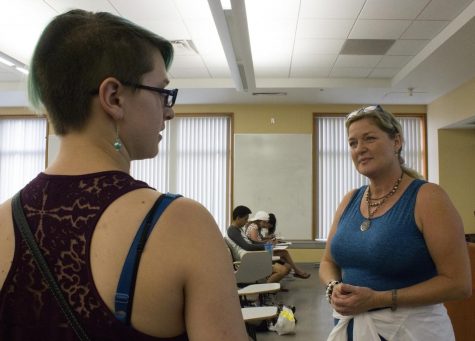Research aims to prove animals relieve stress
An information session set expectations for potential study subjects
DARA EMAN | The Daily Evergreen
WSU researcher Patricia Pendry discusses her research project, Pet for Promotion of Academic Life Skills program (Pet PALS).
September 13, 2017
While many people can attest to the comfort their animal companions bring, science may finally prove their ability to relieve stress.
The Pets for Promotion of Academic Life Skills (Pet PALS) research study information session provided information for potential participants in the study.
Led by Patricia Pendry, associate professor of human development and researcher, the Pet PALS study aims to look at the effect of human-animal interaction on stress levels in people and college students in particular.
Students have many different types of stress to deal with, between academics, homesickness and financial pressures, Pendry said.
“It’s important that students enjoy college, not stressed to the point of becoming ill,” she said.
The information session established expectations for future participants and gave an overview of the study’s goals and procedures.

Patricia Pendry discusses the Pet PALS program with a prospective research volunteer.
Over the course of four weeks, the three randomly split groups will attend a weekly one-hour workshop focused on stress reduction, Pendry said.
Each group will experience different combinations and types of exposure to human-animal interaction and evidence-based stress prevention activities ranging from high to low levels such as meditation and exercise, she said. These are conducted either throughout the four-week programming sessions or at specific time points.
All participants will be able to engage with animals at different levels and at different times, Pendry said.
Palouse PAWS with a Cause, a community partner of the national organization Pet Partners, has volunteered several teams of dogs to come in, Pendry said.
Saliva samples will help measure the stress levels of each participant, Pendry said. Students are more likely to agree to this method because of how easy it is to do, unlike a more invasive blood sample, she said.
Afterward, participants have a six-week period of living their daily lives, then return for a follow-up, where they will receive compensation of $60.
However, if students cannot make it to every session or workshop, they will receive payment based on participation. For example, if they only made it to the beginning and final sessions, they receive $20 for each part.
Pendry said the study has two main research questions: To what extent does human-animal interaction help students, and what needs to go on during this type of interaction?
This study aims to figure out if animal interaction helps at all dealing with stress and the level of interaction needed, Pendry said. That includes whether participants just need to look at animals, sit in the same room with them, or actually pet them.
“We don’t even know if it works,” Pendry said. “It helps the field and practitioners make a case for their work; it becomes more respected as a field.”
After participating in the screening survey during the information sessions, which took place last Tuesday and Wednesday, students received an email by the following Friday if they were accepted into the study or not.
Editor’s note: This article has been edited to reflect that Palouse PAWS is not affiliated with Palouse Animal Wellness and Surgery Center or any other acronym, and the correct name is Palouse Paws with a Cause, a community partner with the national organization Pet Partners. Also, all participants will be able to interact with animals in different combinations and types of exposure.









